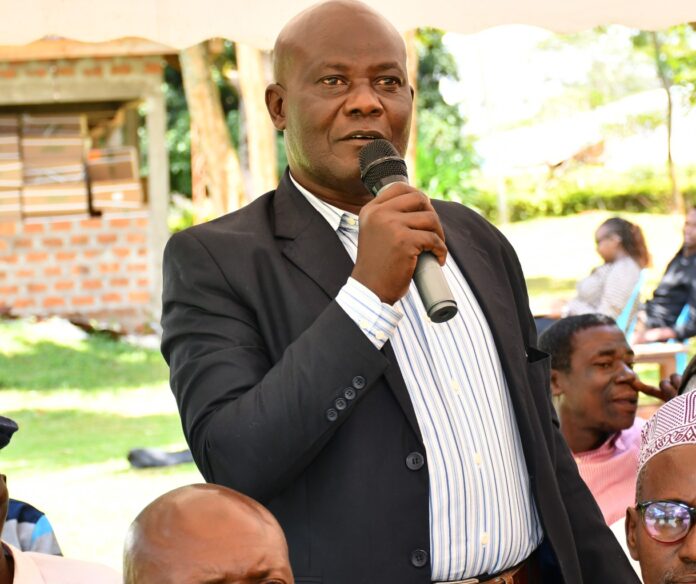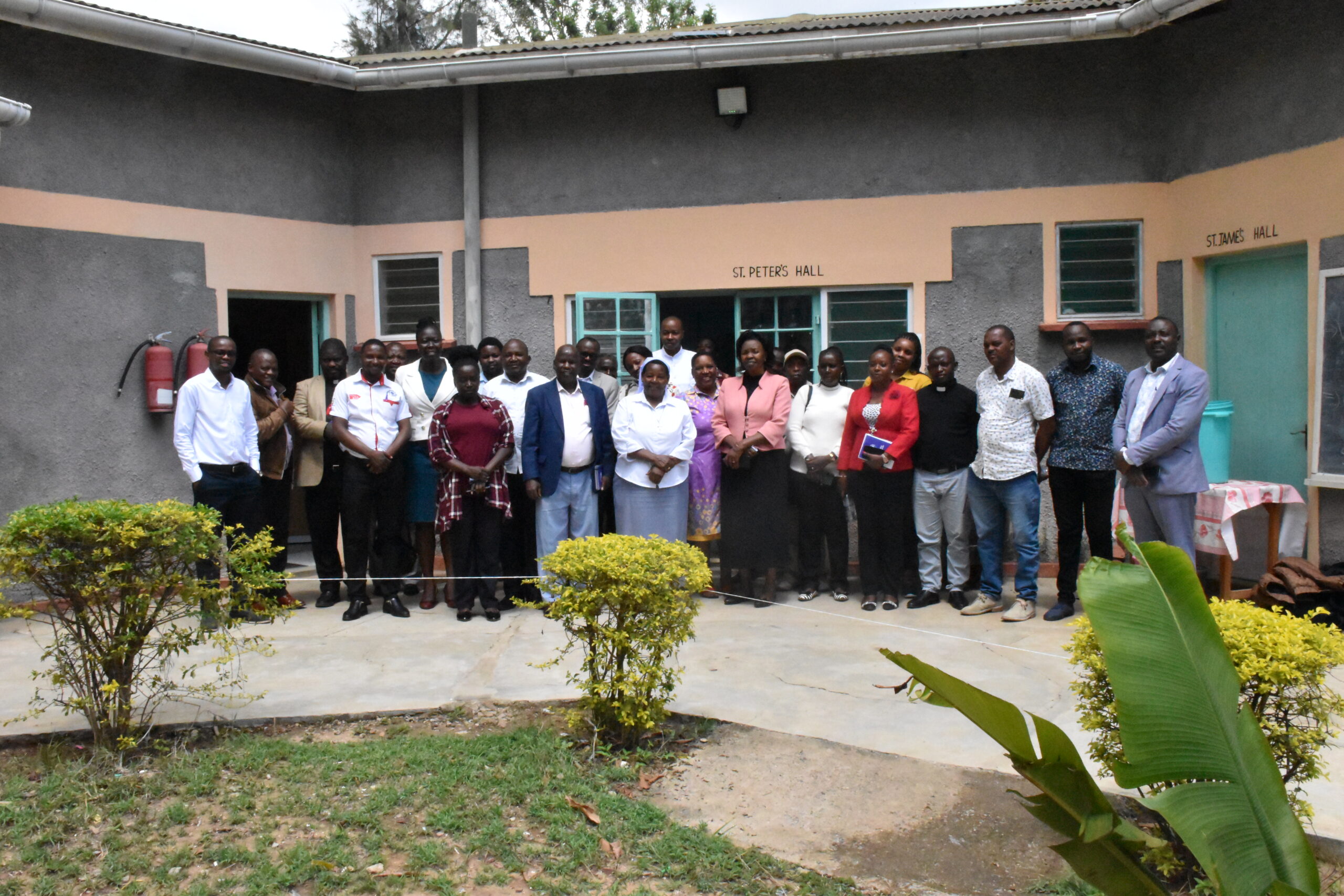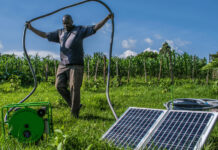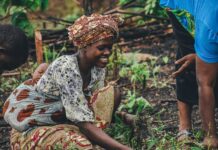By Okong’o Oduya
Busia County, Kenya: More than 120 BT cotton farmers drawn from 22 counties across the country converged in Busia County to learn about the new technological products. The meeting took place at the Kenya Agricultural Livestock and Research Organization(KALRO) at Alupe Center in Busia County.
According to Daniel Magondu, a long-term cotton farmer and biotechnology advocate, from Kirinyaga County, “The only way to solve the food crisis in Kenya is to adopt genetically modified Bacillus thuringiensis crops at a time when the global climate is experiencing climate change.”
These products have been developed by KALRO, especially on cassava, cotton, and Maize. Mogondu, who is the chairperson of the Society for Biotech Farmers of Kenya (SOBIFAK), a registered national farmers’ association that advocates for the incorporation of new biotechnology tools, including genetically modified (GM) crops noted that he has been planting cotton for a long time and his experience with conventional cotton variety was not rewarding compared to BT cotton variety.
He added, “Conventional cotton variety would yield 500 to 700kg per acre while growing BT cotton I harvest between 1,500 to 2,000 kg from the same piece of land.”
Mogondu added, “There is a need for the government to empower Cotton farmers to enable them to access quality seeds not only to address the food crisis in Kenya but also to reduce poverty levels and it is through technologies such as genetically modified and BT produced crops that the country will solve most of these problems.”
Mary Ademba, a BT cotton farmer from Busia county stated how she has benefited from farming BT cotton variety since she embarked on planting the variety adding that “the only way to revive the cotton industry in Kenya is to embrace the BT cotton variety.”
“Textile industries collapsed many years ago because of lack of raw material and poor pricing, but if everyone will go back to plant BT cotton varieties, the produce will be enough to equip the industries with raw material.”
“I have tested BT cotton seed variety compared to the conventional cotton seed variety, I can confirm that the variety does not only pay farmers, it is also safe to both human and animal,” said Ademba demystifying myths and believing that BT/GMO related crops are harmful to both human and animals.
Ademba said, “From cotton farming I am able to pay school fees for my children, I also bought a cow from cotton farming that I milk daily and generate income.”

James Riaga a cotton farmer from Kisumu County, challenges the government and other stakeholders in the cotton sector to, “review cotton prices from the current price of sh50 to sh120 per kilogram of Cotton lint a move he says will attract more farmers especially youths who are shying away from cotton farming.”
“For many years I have been farming cotton, the main challenge is the pricing. The current prices are not motivating, more so to the young people who should be into it. Let the government in consultation with other stakeholders increase prices from the current sh50 to sh120 per kilogram of cotton,” Riaga said on Friday at KALRO Alupe.
Riaga also said that “government authorizing Bacillus thuringiensis and genetically modified seed crops such as maize, cassava, and sorghum crops will be the best way to address food challenges in Kenya.”
Mr Robert Musyoki the Seed Director KALRO said that they are working hard to supply farmers with clean and certified seeds, adding that “some of the things that we are doing is to ensure that farmers get clean planting materials and when it comes to cassava we have technology that we have developed that ensures that materials that go to the farmers are clean and of good quality.”
According to Mr Symplicius Mukok, the County Executive Committee Member in charge of the Agriculture Department, the county government of Busia has recruited 1,000 farmers in 12 wards across the county in a pilot project and distribute them with BT cotton free of charge to produce enough cotton to feed into Mulwanda ginnery as well as have enough raw material for Industrial park at Nasewa to enable the production of edible oil.
“We received 15 tons of free BT Cotton seeds that we issued to at least 1,000 farmers in 12 wards across the county as a pilot project to cover 12,000 acres of land and upon maturity, we know we will have raw material for Mulwanda cotton ginnery and the seeds will end up at Nasewa industrial park to produce edible oil.”
Busia County being among the early uptakers of BT cotton seed Mukok said among the lessons they have learned in the process is that “The harvest is big. We are looking at a maximum of sh1,500 kilograms of cotton per acre of land as opposed to the other varieties harvesting less than 500kgs per acre.”
“The weavers are not attacking the variety and if you must apply the spray, it will just be once, in terms of disease and pest control it is resistant and if you look at the pods they are more per stem, compared to the conventional cotton we are used to and it also requires less water than the traditional cotton.”
Similarly, Dr. Paul Chege works for ISAAA’s AfriCenter, a not-for-profit organization that shares knowledge on agricultural biotechnology and biosafety globally, says that in five years they expect the Kenyan government to have approved three more biotech crops, a move he says will improve food supply in Kenya.
“We believe that in five years we expect that we will have an additional three biotech crops in Kenya’s food basket and that will include maize, cassava among other biotech crops that are in the pipeline.” Said Dr. Chege adding “Right now we are developing sorghum that is resistant to striga weed, we are calling it striga super sorghum which is a bit different from the genetically modified type because it does not have a new gene from outside added into it.”
According to him, by embracing technology, farmers will produce more with fewer resources. “You realize that our population is rising and land is not increasing. We are competing for very constrained pieces of land and if we can produce more with less the better for us and I believe it is through biotechnology we will achieve that.”
Throughout history, scientific and technological advances have greatly impacted the agriculture industry.
Farmers and researchers are constantly working to breed more disease-resistant crop varieties not just in Kenya but across the world.
According to Daniel Magondu, a long-term cotton farmer and biotechnology advocate, from Kirinyaga County, “The only way to solve the food crisis in Kenya is to adopt genetically modified Bacillus thuringiensis crops at a time when the global climate is experiencing climate change.”
While at Kenya Agricultural Livestock and Research Organization(KALRO) at Alupe Center in Busia County in a meeting that brought together more than 120 BT cotton farmers drawn from 22 counties across the country to train them on the technological products. These products have been developed by KALRO, especially on cassava, cotton, and Maize. Mogondu, who is the chairperson of the Society for Biotech Farmers of Kenya (SOBIFAK), a registered national farmers’ association that advocates for the incorporation of new biotechnology tools, including genetically modified (GM) crops noted that he has been planting cotton for a long time and his experience with conventional cotton variety was not rewarding compared to BT cotton variety.
He added, “Conventional cotton variety would yield 500 to 700kg per acre while growing BT cotton I harvest between 1,500 to 2,000 kg from the same piece of land.”
Mogondu added, “There is a need for the government to empower Cotton farmers to enable them to access quality seeds not only to address the food crisis in Kenya but also to reduce poverty levels and it is through technologies such as genetically modified and BT produced crops that the country will solve most of these problems.”
Mary Ademba, a BT cotton farmer from Busia county stated how she has benefited from farming BT cotton variety since she embarked on planting the variety adding that “the only way to revive the cotton industry in Kenya is to embrace the BT cotton variety.”
“Textile industries collapsed many years ago because of lack of raw material and poor pricing, but if everyone will go back to plant BT cotton varieties, the produce will be enough to equip the industries with raw material.”
“I have tasted BT cotton seed variety compared to the conventional cotton seed variety, I can confirm that the variety does not only pay farmers, it is also safe to both human and animal,” said Ademba demystifying myths and believing that BT/GMO related crops are harmful to both human and animals.
Ademba said, “From cotton farming I am able to pay school fees for my children, I also bought a cow from cotton farming that I milk daily and generate income.”
James Riaga a cotton farmer from Kisumu County, challenges the government and other stakeholders in the cotton sector to, “review cotton prices from the current price of sh50 to sh120 per kilogram of Cotton lint a move he says will attract more farmers especially youths who are shying away from cotton farming.”
“For many years I have been farming cotton, the main challenge is the pricing. The current prices are not motivating, more so to the young people who should be into it. Let the government in consultation with other stakeholders increase prices from the current sh50 to sh120 per kilogram of cotton,” Riaga said on Friday at KALRO Alupe.
Riaga also said that “government authorizing Bacillus thuringiensis and genetically modified seed crops such as maize, cassava, and sorghum crops will be the best way to address food challenges in Kenya.”
Mr Robert Musyoki the Seed Director KALRO said that they are working hard to supply farmers with clean and certified seeds, adding that “some of the things that we are doing is to ensure that farmers get clean planting materials and when it comes to cassava we have technology that we have developed that ensures that materials that go to the farmers are clean and of good quality.”
According to Mr Symplicius Mukok, the County Executive Committee Member in charge of the Agriculture Department, the county government of Busia has recruited 1,000 farmers in 12 wards across the county in a pilot project and distribute them with BT cotton free of charge to produce enough cotton to feed into Mulwanda ginnery as well as have enough raw material for Industrial park at Nasewa to enable the production of edible oil.
“We received 15 tons of free BT Cotton seeds that we issued to at least 1,000 farmers in 12 wards across the county as a pilot project to cover 12,000 acres of land and upon maturity, we know we will have raw material for Mulwanda cotton ginnery and the seeds will end up at Nasewa industrial park to produce edible oil.”
Busia County being among the early uptakers of BT cotton seed Mukok said among the lessons they have learned in the process is that “The harvest is big. We are looking at a maximum of sh1,500 kilograms of cotton per acre of land as opposed to the other varieties harvesting less than 500kgs per acre.”
“The weavers are not attacking the variety and if you must apply the spray, it will just be once, in terms of disease and pest control it is resistant and if you look at the pods they are more per stem, compared to the conventional cotton we are used to and it also requires less water than the traditional cotton.”
Similarly, Dr. Paul Chege works for ISAAA’s AfriCenter, a not-for-profit organization that shares knowledge on agricultural biotechnology and biosafety globally, says that in five years they expect the Kenyan government to have approved three more biotech crops, a move he says will improve food supply in Kenya.
“We believe that in five years we expect that we will have an additional three biotech crops in Kenya’s food basket and that will include maize, cassava among other biotech crops that are in the pipeline.” Said Dr. Chege adding “Right now we are developing sorghum that is resistant to striga weed, we are calling it striga super sorghum which is a bit different from the genetically modified type because it does not have a new gene from outside added into it.”
According to him, by embracing technology, farmers will produce more with fewer resources. “You realize that our population is rising and land is not increasing. We are competing for very constrained pieces of land and if we can produce more with less the better for us and I believe it is through biotechnology we will achieve that.”
Throughout history, scientific and technological advances have greatly impacted the agriculture industry.
Farmers and researchers are constantly working to breed more disease-resistant crop varieties not just in Kenya but across the world.
According to Daniel Magondu, a long-term cotton farmer and biotechnology advocate, from Kirinyaga County, “The only way to solve the food crisis in Kenya is to adopt genetically modified Bacillus thuringiensis crops at a time when the global climate is experiencing climate change.”
While at Kenya Agricultural Livestock and Research Organization(KALRO) at Alupe Center in Busia County in a meeting that brought together more than 120 BT cotton farmers drawn from 22 counties across the country to train them on the technological products. These products have been developed by KALRO, especially on cassava, cotton, and Maize. Mogondu, who is the chairperson of the Society for Biotech Farmers of Kenya (SOBIFAK), a registered national farmers’ association that advocates for the incorporation of new biotechnology tools, including genetically modified (GM) crops noted that he has been planting cotton for a long time and his experience with conventional cotton variety was not rewarding compared to BT cotton variety.
He added, “Conventional cotton variety would yield 500 to 700kg per acre while growing BT cotton I harvest between 1,500 to 2,000 kg from the same piece of land.”
Mogondu added, “There is a need for the government to empower Cotton farmers to enable them to access quality seeds not only to address the food crisis in Kenya but also to reduce poverty levels and it is through technologies such as genetically modified and BT produced crops that the country will solve most of these problems.”
Mary Ademba, a BT cotton farmer from Busia county stated how she has benefited from farming BT cotton variety since she embarked on planting the variety adding that “the only way to revive the cotton industry in Kenya is to embrace the BT cotton variety.”
“Textile industries collapsed many years ago because of lack of raw material and poor pricing, but if everyone will go back to plant BT cotton varieties, the produce will be enough to equip the industries with raw material.”
“I have tasted BT cotton seed variety compared to the conventional cotton seed variety, I can confirm that the variety does not only pay farmers, it is also safe to both human and animal,” said Ademba demystifying myths and believing that BT/GMO related crops are harmful to both human and animals.
Ademba said, “From cotton farming I am able to pay school fees for my children, I also bought a cow from cotton farming that I milk daily and generate income.”
James Riaga a cotton farmer from Kisumu County, challenges the government and other stakeholders in the cotton sector to, “review cotton prices from the current price of sh50 to sh120 per kilogram of Cotton lint a move he says will attract more farmers especially youths who are shying away from cotton farming.”
“For many years I have been farming cotton, the main challenge is the pricing. The current prices are not motivating, more so to the young people who should be into it. Let the government in consultation with other stakeholders increase prices from the current sh50 to sh120 per kilogram of cotton,” Riaga said on Friday at KALRO Alupe.
Riaga also said that “government authorizing Bacillus thuringiensis and genetically modified seed crops such as maize, cassava, and sorghum crops will be the best way to address food challenges in Kenya.”
Mr Robert Musyoki the Seed Director KALRO said that they are working hard to supply farmers with clean and certified seeds, adding that “some of the things that we are doing is to ensure that farmers get clean planting materials and when it comes to cassava we have technology that we have developed that ensures that materials that go to the farmers are clean and of good quality.”
According to Mr Symplicius Mukok, the County Executive Committee Member in charge of the Agriculture Department, the county government of Busia has recruited 1,000 farmers in 12 wards across the county in a pilot project and distribute them with BT cotton free of charge to produce enough cotton to feed into Mulwanda ginnery as well as have enough raw material for Industrial park at Nasewa to enable the production of edible oil.
“We received 15 tons of free BT Cotton seeds that we issued to at least 1,000 farmers in 12 wards across the county as a pilot project to cover 12,000 acres of land and upon maturity, we know we will have raw material for Mulwanda cotton ginnery and the seeds will end up at Nasewa industrial park to produce edible oil.”
Busia County being among the early uptakers of BT cotton seed Mukok said among the lessons they have learned in the process is that “The harvest is big. We are looking at a maximum of sh1,500 kilograms of cotton per acre of land as opposed to the other varieties harvesting less than 500kgs per acre.”
“The weavers are not attacking the variety and if you must apply the spray, it will just be once, in terms of disease and pest control it is resistant and if you look at the pods they are more per stem, compared to the conventional cotton we are used to and it also requires less water than the traditional cotton.”
Similarly, Dr. Paul Chege works for ISAAA’s AfriCenter, a not-for-profit organization that shares knowledge on agricultural biotechnology and biosafety globally, says that in five years they expect the Kenyan government to have approved three more biotech crops, a move he says will improve food supply in Kenya.
“We believe that in five years we expect that we will have an additional three biotech crops in Kenya’s food basket and that will include maize, cassava among other biotech crops that are in the pipeline.” Said Dr. Chege adding “Right now we are developing sorghum that is resistant to striga weed, we are calling it striga super sorghum which is a bit different from the genetically modified type because it does not have a new gene from outside added into it.”
According to him, by embracing technology, farmers will produce more with fewer resources. “You realize that our population is rising and land is not increasing. We are competing for very constrained pieces of land and if we can produce more with less the better for us and I believe it is through biotechnology we will achieve that.”













